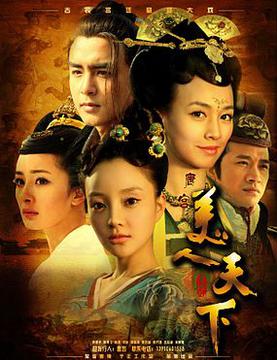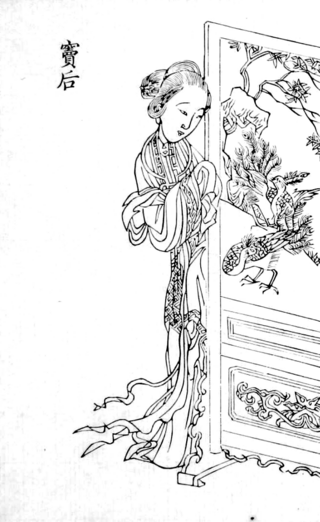
劉 / 刘 is an East Asian surname. pinyin: Liú in Mandarin Chinese, Lau4 in Cantonese. It is the family name of the Han dynasty emperors. The character 劉 originally meant 'battle axe', but is now used only as a surname. It is listed 252nd in the classic text Hundred Family Surnames. Today, it is the 4th most common surname in mainland China as well as one of the most common surnames in the world.
Li Chéngqián (李承乾), courtesy name Gaoming (高明), formally Prince Min of Hengshan (恆山愍王), was a crown prince of the Chinese Tang dynasty. He was Emperor Taizong's oldest son and first crown prince, but was replaced later by his younger brother Li Zhi.

Song is the pinyin transliteration of the Chinese family name 宋. It is transliterated as Sung in Wade-Giles, and Soong is also a common transliteration. In addition to being a common surname, it is also the name of a Chinese dynasty, the Song dynasty, written with the same character.

Emperor Gaozong of Tang, personal name Li Zhi, was the third emperor of the Chinese Tang dynasty, ruling from 649 to 683; after January 665, he handed power over the empire to his second wife Empress Wu, and her decrees were carried out with greater force than the decrees of Emperor Gaozong's. Emperor Gaozong was the youngest son of Emperor Taizong and Empress Zhangsun; his elder brothers were Li Chengqian and Li Tai.

Jin is the Hanyu pinyin transliteration of a number of Chinese surnames. The most common one, Jīn 金, literally means "gold" and is 29th in the list of "Hundred Family Surnames". As of 2006, it is ranked the 64th most common Chinese surname and is sometimes transliterated as Chin.

Wei Zheng, courtesy name Xuancheng, posthumous name Duke Wenzhen of Zheng, was a Chinese politician and historian. He served as a chancellor of the Tang dynasty for about 13 years during the reign of Emperor Taizong. He was also the lead editor of the official history of the Sui dynasty, the Book of Sui, which was composed in 636.

Zhangsun Wuji, courtesy name Fuji (輔機), formally the Duke of Zhao, was a Chinese politician who served as a chancellor in the early Tang dynasty. He was Empress Zhangsun's brother, which made him a brother-in-law of Emperor Taizong and a maternal uncle of Emperor Gaozong. He was an important advisor to Li Shimin when the latter was still the Prince of Qin during the reign of his father, Emperor Gaozu. He helped Li Shimin overcome his brothers Li Jiancheng and Li Yuanji in a succession struggle at the Xuanwu Gate Incident, eventually enabling Li Shimin to become the heir apparent and later the emperor. He was also instrumental in Emperor Taizong's selection of Li Zhi as the Crown Prince, and was exceedingly powerful after Li Zhi took the throne as Emperor Gaozong. However, he gradually fell out of his nephew's favour by failing to support Emperor Gaozong's decision to depose his first wife, Empress Wang, and replacing her with Empress Wu, especially after the beginning of the new year 657 with the power of Empress Wu fell more. In 659, Zhangsun Wuji was falsely accused of treason by Empress Wu's political ally, Xu Jingzong, and eventually ordered to be sent into exile by Emperor Gaozong. Xu Jingzong subsequently sent the official Yuan Gongyu (袁公瑜) to force Zhangsun Wuji to commit suicide on his way to exile.
Empress Zhangsun (長孫皇后, personal name unknown, presumably Wugou, formally Empress Wendeshunsheng or, in short, Empress Wende, was a Chinese essayist and an empress of the Chinese Tang dynasty. She was the wife of Emperor Taizong and the mother of Emperor Gaozong. She was well educated, and her ancestors were of Xianbei ethnicity. Their original surname was Tuoba, later changed to Zhangsun. During her tenure as empress, she served as a loyal assistant and honest advisor to her husband, Emperor Taizong.
Xu Jingzong, courtesy name Yanzu, posthumously known as Duke Gong of Gaoyang, was a Chinese cartographer, historian, and politician who served as a chancellor in the Tang dynasty. Allied with Emperor Gaozong's powerful wife, Empress Wu, Xu Jingzong was exceedingly powerful and effective throughout most of Gaozong's reign. By order of Empress Wu, he played a major role in the elimination of the chancellors opposed to her, between years 657 to 659 and 665.
Dugu (獨孤) is an extremely rare Chinese compound surname of Xianbei origin. There is also a small Korean population with this surname ; many of them are found in North Korea, mainly in Ryongchon County and Uiju County near the Chinese border.
Xin is the romanization of several Chinese surnames including Xīn 辛, Xīn 新 and Xìn 信. Xīn 辛 is the commonest among these; it is the 379th surname in the Hundred Family Surnames.

Love Legend of the Tang Dynasty, also known as Da Tang Qing Shi, is a Chinese historical television series based on the legend of an illicit romance between the Tang dynasty Princess Gaoyang and a monk called Bianji. The series was directed by Gong Ruofei, starring Tang Guoqiang, Shen Aojun, Nie Yuan, Zhang Tong, Pan Yueming, Pan Yaowu, and Qin Lan. It was first broadcast in mainland China in 2001.

Beauty World, also known as Tang Gong Meiren Tianxia and World of a Beauty, is a Chinese fantasy-supernatural television series set in the Tang dynasty. It was directed by Lee Wai-chu, produced and written by Yu Zheng, and starred Zhang Ting, Ming Dow, Li Xiaolu, Mickey He, Zheng Guolin, Yang Mi and Tong Liya in the leading roles. The series is regarded as a counterpart to Beauty's Rival in Palace, a similar 2010 television series set in the Han Dynasty. It was first aired on 21 October 2011 on Guangzhou Zonghe Channel in mainland China.
Fu is an ancient Han Chinese surname of imperial origin which is at least 4,000 years old. The great-great-great-grandson of the Yellow Emperor, Dayou, bestowed this surname to his son Fu Yi and his descendants. Dayou is the eldest son of Danzhu and grandson of Emperor Yao.
Empress Wende may refer to:

Lu is a Chinese surname. It is also spelled Lo according to the Cantonese pronunciation. Lu 路 is listed 138th in the Song dynasty classic text Hundred Family Surnames. Lu 路 is the 116th most common surname in China, with a total population of 2.35 million.

Dou is the Mandarin pinyin romanization of the Chinese surname written 窦 in simplified Chinese and 竇 in traditional Chinese. It is romanized Tou in Wade–Giles. Dou is listed 39th in the Song dynasty classic text Hundred Family Surnames. As of 2008, it is the 219th most common surname in China, shared by 380,000 people.

Shǐ (史) is a Chinese surname meaning "history" of "official historiographer". It is romanized Shih in Wade–Giles, or Sze or Si in Cantonese romanization. According to a 2008 study, it was the 82nd most common name in China. A 2013 study found that it is shared by 2.85 million people, or 0.210% of the population, with the province with the most people being Henan. It is the 63rd name on the Hundred Family Surnames poem.

Zhangsun Shunde, titled Duke of Pi, was a general and officer in the early Tang dynasty. He is one of 24 honored founding officials of the Tang dynasty at Lingyan Pavilion, and also a distant relative to Zhangsun Wuji and Empress Zhangsun. They share a common ancestor, Zhangsun Zhi, five generations ago for Zhangsun Wuji and Empress Zhangsun, and four generations ago for Zhangsun Shunde.

Empress Taimu was posthumously honored the first empress of the Chinese Tang dynasty. She was known as Duchess Dou or Lady Dou (竇氏) throughout her lifetime, and was the wife of Emperor Gaozu and mother of Emperor Taizong.











